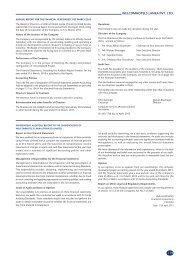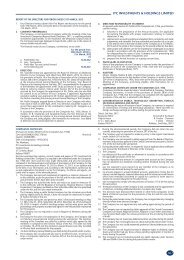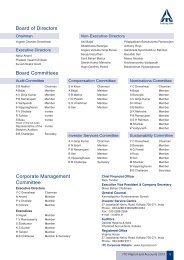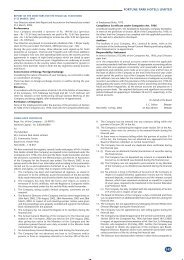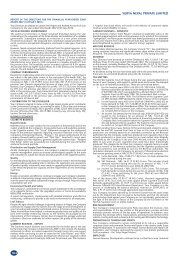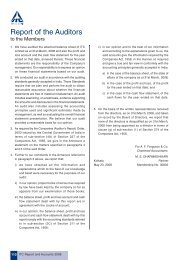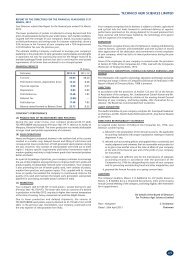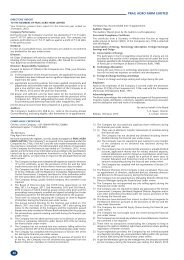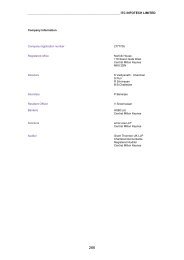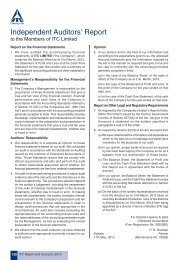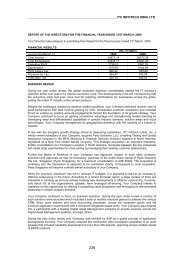ITC INFOTECH LIMITED
ITC INFOTECH LIMITED
ITC INFOTECH LIMITED
Create successful ePaper yourself
Turn your PDF publications into a flip-book with our unique Google optimized e-Paper software.
<strong>ITC</strong> <strong>INFOTECH</strong> <strong>LIMITED</strong>report and for no other purpose. To the fullest extent permitted by law,we do not accept or assume responsibility to anyone other than thecompany and the company’s members as a body, for our audit work, forthis report, or for the opinions we have formed.Respective responsibilities of directors and auditorAs explained more fully in the Statement of directors’ responsibilities, thedirectors are responsible for the preparation of the financial statementsand for being satisfied that they give a true and fair view. Our responsibilityis to audit the financial statements in accordance with applicable law andInternational Standards on Auditing (UK and Ireland). Those standardsrequire us to comply with the Auditing Practices Board’s (APB’s) EthicalStandards for Auditors.Scope of the audit of the financial statementsAn audit involves obtaining evidence about the amounts and disclosuresin the financial statements sufficient to give reasonable assurance that thefinancial statements are free from material misstatement, whether causedby fraud or error. This includes an assessment of: whether the accountingpolicies are appropriate to the company’s circumstances and have beenconsistently applied and adequately disclosed; the reasonableness ofsignificant accounting estimates made by the directors; and the overallpresentation of the financial statements.Opinion on financial statementsIn our opinion the financial statements, excluding the supplementaryinformation:• give a true and fair view of the state of the company's affairs as at 31March 2011 and of the company’s profit for the year then ended;• have been properly prepared in accordance with United KingdomGenerally Accepted Accounting Practice; and• have been prepared in accordance with the requirements of theCompanies Act 2006.Opinion on other matter prescribed by the Companies Act 2006In our opinion the information given in the Report of the directors for thefinancial year for which the financial statements are prepared is consistentwith the financial statements.Matters on which we are required to report by exceptionWe have nothing to report in respect of the following matters where theCompanies Act 2006 requires us to report to you if, in our opinion:• adequate accounting records have not been kept, or returns adequatefor our audit have not been received from branches not visited by us; or• the financial statements are not in agreement with the accountingrecords and returns; or• certain disclosures of directors’ remuneration specified by law are notmade; or• we have not received all the information and explanations we requirefor our audit.Simon JonesSenior Statutory Auditorfor and on behalf of Grant Thornton UK LLP,Statutory Auditor, Chartered AccountantsCentral Milton Keynes9 May, 2011PRINCIPAL ACCOUNTING POLICIESBasis of accountingThe financial statements have been prepared under the historical costconvention.The principal accounting policies of the company are set out below andremain unchanged from the previous year.Financial instrumentsFinancial liabilities and equity instruments are classified according to thesubstance of the contractual arrangements entered into. An equity instrumentis any contract that evidences a residual interest in the assets of the entityafter deducting all of its financial liabilities.Where the contractual obligations of financial instruments (including sharecapital) are equivalent to a similar debt instrument, those financial instrumentsare classed as financial liabilities. Financial liabilities are presented as suchin the balance sheet. Finance costs and gains or losses relating to financialliabilities are included in the profit and loss account. Finance costs arecalculated so as to produce a constant rate of return on the outstandingliability.Where the contractual terms of share capital do not have any terms meetingthe definition of a financial liability then this is classed as an equity instrument.Dividends and distributions relating to equity instruments are debited directto equity.TurnoverTurnover is the total amount receivable by the company for goods suppliedand services provided, excluding VAT and trade discounts.Turnover from services performed on a “time and materials” basis isrecognised as income as and when the services are performed.Turnover from software projects performed on a “time bound fixed price”basis is recognised as income at the point at which the “milestone” agreedwith the customer is achieved.Fixed assetsAll fixed assets are initially recorded at cost.DepreciationDepreciation is calculated to write down the cost of an asset, less its estimatedresidual value, over the useful economic life of that asset as follows:Leasehold improvements – 25%Fixtures and fittings – 25%Computer equipment – 25%Leased assetsAll leases are operating leases and the payments made under them are chargedto the profit and loss account on a straight-line basis over the lease term.Deferred taxationDeferred tax is recognised on all timing differences where the transactionsor events that give the company an obligation to pay more tax in the future,or a right to pay less tax in the future, have occurred by the balance sheetdate. Deferred tax assets are recognised when it is more likely than notthat they will be recovered. Deferred tax is measured using rates of taxthat have been enacted or substantively enacted by the balance sheet date.Foreign currenciesTransactions in foreign currencies are translated at the exchange rate rulingat the date of the transaction. Monetary assets and liabilities are translatedat the rate of exchange ruling at the balance sheet date. All exchangedifferences are dealt with through the profit and loss account except thatgains and losses arising from the retranslation of the opening retainedearnings in overseas branches are adjusted against the reserves.Recruitment costsLegal costs and other charges incurred to obtain visas and other requiredimmigration papers for recruits, recruitment fees and relocation costs arecharged to the Profit & Loss Account when such costs are incurred.130



